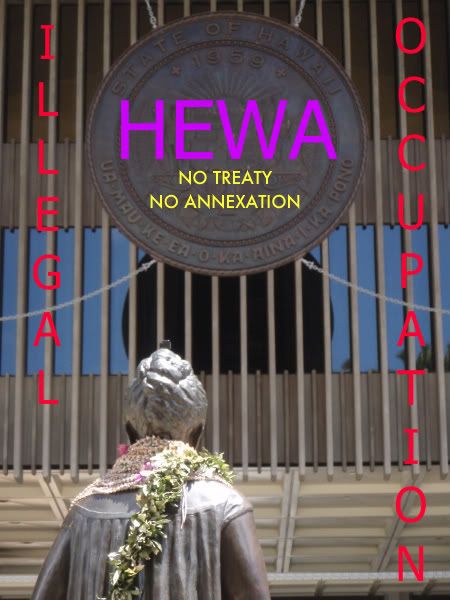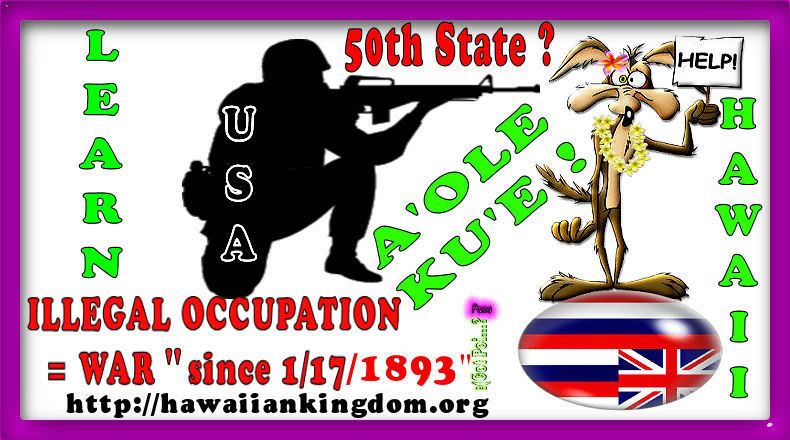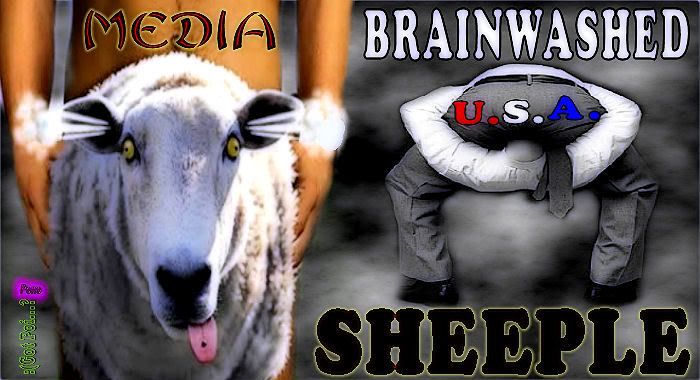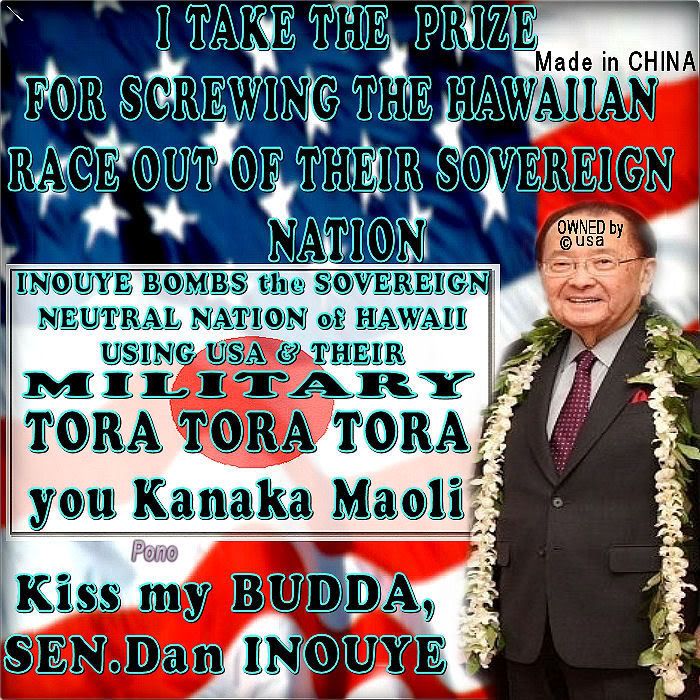Get Your Own Shirt Here - UnKauInoa.org
Get Your Own Shirt Here - UnKauInoa.org
Aloha Kakou.
Last Friday (April 1st) marked the first anniversary of the creation of the Chagos Marine Protected Area. For Hawaiian Nationals events involving island communities in the Indian Ocean may not be a priority concern at this time given the significance of the the HCR 107 debate locally, however residents of archipelagos globally often share historical commonalities and the study of these are oftentimes disputed and contested particularly at the legal level (http://www.timesonline.co.uk/tol/news/environment/article7104266.ece) which can lead to a rewarding transparency of events locally in Ko Hawai'i Pae 'Aina particularly in the pursuit of justice arena.
In the latter part of the 1960s and early 1970s inhabitants of these coral atolls were forcibly displaced to make way for a U.S. military base on Diego Garcia the largest of the islands. Many of these 1,500 to 2,000 original inhabitants are now deceased with their descendants residing in Mauritius, Britain, and the Seychelles. To its credit Wikipedia have an extensive article on Diego Garcia with a number of external resources for information to comprehend the issue for the novice and interested parties available by clicking here: http://en.wikipedia.org/wiki/Diego_Garcia
Chagossians as the islanders are known remain divided as to the benefits and disadvantages of the Chagos Marine Protected Area, many believe the Protected Area the largest marine reserve on Earth, at a whopping 545,000-square kilometers will prevent the Chagos Islanders from ever returning ostensibly the purpose of the Reserve is to prevent deep-sea mining, industrial fishing, and protect corals and wildlife. According to Allen Vincatassin, President of the Government in Exile of the Chagossian People (a.k.a. Diego Garcia and Chagos Islands Council) the Government will make good that the MPA will be adjusted to incorporate fishing livelihood rights in the event the Chagos Islanders do return. This has been queried by a Wikileaks U.S. cable revelation last December which revealed that Colin Roberts of the UK Foreign and Commonwealth Office for Overseas Territory allegedly said the MPA should have quote: "no human footprints" or "Man Fridays." The historical strategic value of the Chagos Islands as with Hawai'i is immense to the powers of domination and can be understood on the larger canvas by clicking here:
http://www.us-uk-interventions.org/Chagos_Islands.html
One is reminded of the U.S. army spy General John Schofield's secret task to the Hawaiian Kingdom in 1872 to conduct an investigation into the viability of a U.S. military presence on the islands and under this pretext he later testified: "If we do not occupy and fortify Pearl Harbor our enemy will occupy it as a base from which to conduct operations against our Pacific coast." The campaign tactics of the Chagossians are worthy of monitoring by Hawaiian Nationals in order to draw comparative analysis locally. Further data on the Chagos Islands is available here: http://www.chagossupport.org.uk.
April 22nd marks International Mother Earth Day, the Universal Declaration of the Rights of Mother Earth adopted at the Cochabamba summit in Bolivia last year (http://motherearthrights.org) provides a legal framework in the preservation and protection of this wonderful home we call Earth and encourages us all to actively participate in the banquet of life.
-Onipa'a.

 The Akaka Bill Is Unconstitutional
The Akaka Bill Is Unconstitutional
Click on email testimony
Type in SB367
Type in comments, and click the send button !!!
SB 367 SD3 HD1would create a PUC regulatory structure for undersea cables whereby ratepayers would carry all of the risk and the utility would make all of the profit.
* The utility argument was that it had to happen this year so that a cable company could be chosen this fall.
However, which islands will get proposed windfarms and which size the undersea cables need to be has hit a snag.
Last year the Public Utilities Commission (PUC) ruled that both FirstWind (Moloka`i) and Castle & Cooke (Lana`i) had to file with the PUC by March 18, 2011 term sheets laying out the cost of wind energy.
FirstWind defaulted and did not file a timely excuse. Almost 2 weeks late, FirstWind asked for an 8 month extension.
* The argument that Big Wind is the only answer is also in dispute. The Big Wind EIS Preparation Notice said that there are two alternatives, Big Wind with planning and Big Wind without planning.
Numerous comments to the EISPN challenged this.
DBEDT Office of Planning (March 1, 2011): “it is necessary for the draft EIS to explore alternatives”
US Environmental Protection Agency (Feb 28, 2011): “We recommend analysis of additional alternatives as early as possible”
Rather than rush thru a bad piece of legislation, we should wait until it has been determined whether Big Wind makes sense, and if so, under what conditions.
Please hold SB 367
Mahalo
We once again voice our strong opposition of your seditious Akaka Bill as Hawai`i nationals of the Kingdom of Hawai`i, including native Hawaiians for which this Bill is being created for....
...The Bill spreads misinformation and is not a road to reconciliation to right the wrongs committed by the United States of America against the citizens of the Hawaiian Kingdom....
Contrary to Senator Akaka's statement, we do not desire to be on equal footing with American Indians under the Department of the Interior nor subjected to its paternalistic practices.
We have already been recognized by the United States of America as an independent sovereign nation-state which we have never relinquished.
We reject this legislation providing parity in federal policy towards indigenous people, especially because we are not indigenous to the United States but bona fide subjects of the still existent Kingdom of Hawai`i albeit under the US belligerent occupation of which the United States is in continuous violation of the international law of occupation....
He Hawai`i au,
David M.K. Inciong, II
Pearl City, O`ahu
Occupied Hawai`i
Dear Mr. Van Dyke and Senator Akaka:
We once again voice our strong opposition of your seditious Akaka Bill as Hawaii nationals of the Kingdom of Hawaii, including native Hawaiians for which this Bill is being created for. The Akaka Bill is self-contradictory and fosters the WASP racist Manifest Destiny doctrines. The Bill spreads misinformation and is not a road to reconciliation to right the wrongs committed by the United States of America against the citizens of the Hawaiian Kingdom. It's a sophism.
Native Hawaiian Government Reorganization Act of 2011 (S.675) and the introduced identical companion bill (H.R. 1250) in the U.S. House of Representatives are repugnant and railroading native Hawaiians into a nefarious U.S. hostage box.
Contrary to Senator Akaka's statement, we do not desire to be on equal footing with American Indians under the Department of the Interior nor subjected to its paternalistic practices. We have already been recognized by the United States of America as an independent sovereign nation-state which we have never relinquished. We reject this legislation providing parity in federal policy towards indigenous people, especially because we are not indigenous to the United States but bona fide subjects of the still existent Kingdom of Hawaii albeit under the U.S. belligerent occupation of which the United States is in continuous violation of the international law of occupation.
Again, Senator Inouye plays with semantics when stating the Native Hawaiian Government Reorganization Act is the right to self-determination and self-governance. This is an attempt to usurp the jurisdiction, territory, and the governance of the still-existing Kingdom of Hawaii. This measure begins a process of establishing a government to government relationship between the federal government and the native people of Hawaii is misleading and disingenuous. An ultra vires process to re-form a Native Hawaiian government that could negotiate with the state and federal government on behalf of Hawaii's indigenous people is plainly synesthesia.
We, Hawaii nationals and oppoonents to the bill, have been barred and supressed from testimony in U.S. Congress and the pertinent committees that need to hear our objections. This sweeping cover-up is done to give the proponents free-rein to control the outcome for elite pecuniary benefits and not for the true benefit for the native Hawaiians.
As Congresswoman Mazie K. Hirono puts it: Senator Akaka as Chairman of the Indian Affairs Committee as he is able to set the Committee’s agenda and will be able to push the bill forward in the Senate and work with the new House Majority.
Congresswoman Colleen Hanabusa erroneously said, "this bill will allow them to continue on the path towards reconciliation with the United States." We know this to be not the case. Justice for Hawaii will be for the United States of America to de-occupy Hawaii and re-instate the Kingdom of Hawaii, respect our human rights, and honor the ratified treaties we have with it as the Supreme Law of the land as stated in its Constitution.
Governor Neil Abercrombie said: "This measure is long overdue as enabling legislation allowing Native Hawaiians and the State of Hawaii to resolve outstanding issues fairly and comprehensively." This can only be done by returning Hawaii to its multi-ethnic nationals of the Kingdom of Hawaii and observing the international laws and the constitutional laws of the Kingdom of Hawaii and that of the United States.
We are cognizant that the treaty of annexation twice submitted were rejected by President Cleveland and then by the U.S. Congress for a lack of 2/3rds majority vote as spelled out by the U.S. Constitution. The Newlands Resolution was unlawful and had no jurisdiction in Hawaii or any other foreign country because it is a domestic, internal instrument, only valid within its own territory and not beyond it.
President Barack Obama adheres to his party line and being born and raised in U.S. occupied Hawaii. The U.S Department of Justice's support of the bill is dubious since legal issues raised by proposed Presidential Proclamation to extend the territorial sea, which came from the opinions of the Office of Legal Counsel, vol. 12, p. 238-263, October 4, 1988, which the excerpts commenting on the annexation of Hawaii are found on pp. 250-252.
The snollygosters have enlisted the support of the National Congress of American Indians, the Alaska Federation of Natives, and groups throughout the Native Hawaiian community including the Association of Hawaiian Civic Clubs, the Native Hawaiian Bar Association, the Council for Native Hawaiian Advancement, and two state agencies which represent the interests of the Native Hawaiian people, the Office of Hawaiian Affairs and the Department of Hawaiian Home Lands to push its agenda regardless of what the native Hawaiians want. Many could be suffering from the Stockholme Syndrome or will benefit greatly from this Bill at the expense of the native Hawaiians and certainly from all the Hawaii nationals of the Hawaiian Kingdom.
Referring to the Apology Bill, Senator Slade Gorton remarked, "...the only logical consequence is total independence." We whole-heartedly agree.
The Honolulu Advertiser's Poll regarding the Akaka Bill dated 23 February, 2010 had 4,500 respondents that participated. it read that 10 percent needed more time; 30 percent said Yes, they were for it; and 60 percent said No, they were against it. It seems higly questionable that a poll published by the Honolulu Advertiser in May of last year reported that 66 percent Hawaii resident support federal recognition for Native Hawaiians, and 82 percent of Native Hawaiians polled support federal recognition. Note that the number of respondents were not listed.
It's laughable to believe this is a parity government-to-government relationship with the United States to address issues such as criminal and civil jurisdiction, historical grievances, and jurisdiction and control of natural resources, lands, and assets. It's an attempt to continue to steal jurisdiction, natural resources, lands and assets from the Kingdom of Hawaii and its citizens. We understand quite well how decisions will be made; piracy on the high seas at its best! We will continue to oppose your criminal actions.
He Hawaii au,
Tane

Many think of 1776 as the defining year of American history, when we became a nation devoted to the pursuit of happiness through self- government.
In Unfamiliar Fishes, Sarah Vowell argues that 1898 might be a year just as defining, when, in an orgy of imperialism, the United States annexed Hawai`i, Puerto Rico, and Guam, and invaded first Cuba, then the Philippines, becoming an international superpower practically overnight.